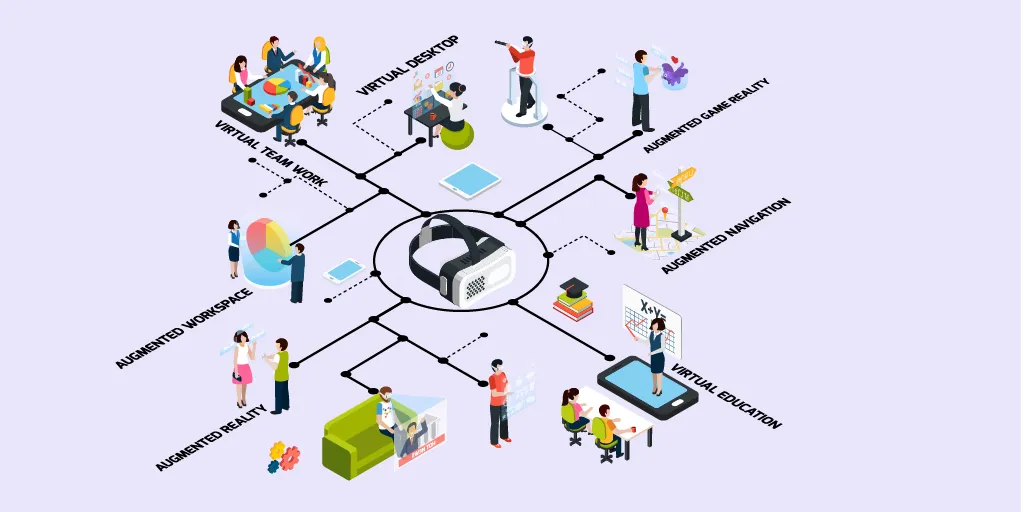Technology


5 min


Discover how Mobile App Development Companies are using AR and VR Development Services to shape the future of mobile apps. Explore innovative use cases and emerging trends in this dynamic space. Stay ahead with insights into Augmented Reality (AR) and Virtual Reality (VR) technologies. Continue Reading.

By Dhruv Joshi
04 Sep, 2023
AR & VR app development has come a long way in current years, and the future looks even more exciting with the emergence of those technologies. These technologies have changed the way we interact with our mobile devices, offering immersive and engaging experiences that were previously impossible. But the best Mobile App Development Company can help make this even better!

Augmented Reality (AR) is a tech that advances the real world with digital content in real-time, making it more interactive and engaging. It is a way to superimpose computer-generated images, videos, or sounds onto a person's view of the real world, usually through a smartphone, tablet, or special AR glasses. Mobile app development services have played a crucial role in bringing AR technology to the masses.
For example, imagine looking at a city street through an AR app on your phone. You might see restaurant reviews, directions, and special offers superimposed over the actual storefronts, or you could see a 3D model of a car appear on your driveway while shopping for a new vehicle.
AR can also be used for gaming, education, and training, allowing users to interact with virtual objects in a real-world setting.
In simple terms, AR allows you to experience the real world with an added layer of virtual information that enhances and improves the overall experience, thanks to the advancements made by mobile app development companies in AR technology.

Virtual Reality (VR) is a tech that makes a simulated environment similar to or completely different from the real world. VR combines specialized hardware and software to immerse users in a completely different world, allowing them to interact with virtual objects and environments realistically. Mobile app development services have played a critical role in bringing VR technology to the masses, making it more accessible and user-friendly.
For instance, imagine putting on a VR headset and being transported to a completely different world, such as a tropical island or a space station. The headset tracks your head movements and displays a 360-degree view of this virtual world, making it feel like you're actually there.
VR can be used for many applications, from gaming and entertainment to education and training. It can also be used for therapeutic purposes, such as treating anxiety and phobias. In simple terms, VR allows you to experience a completely different world that feels just as real as the real world but with unlimited possibilities and no limits.
To experience the benefits of VR technology, you only need to seek the help of a mobile app development company specializing in VR.
Mobile app development rapidly evolves with new techs and trends such as AI, ML, IoT, AR, and VR. AI and ML will offer personalized experiences, while IoT will enable seamless integration with various devices.
AR and VR will create immersive experiences that blur the line between the real and digital worlds. In the coming years, these emerging technologies will shape the mobile app development services industry, leading to more innovative and engaging mobile apps.
Augmented Reality and Virtual Reality are two technologies that can completely transform marketing from Ecommerce to various businesses and completely change the marketing style, thanks to the innovative solutions developed by mobile app development companies. Also, it can change how we use our mobile phones, tablets, and other portable devices. Let's see the trends and uses cases.
Here are some of the current trends in AR technology:

Mobile AR is perhaps the most well-known form of AR, as it is accessible to almost everyone with a smartphone or tablet. The popularity of mobile AR can be attributed to the advancements made by mobile app development services that have brought this technology to millions of users worldwide.
Popular apps like Pokémon Go and Snapchat filters have shown how AR can create immersive and engaging experiences. Thanks to the innovative work of mobile app development companies, we expect to see even more sophisticated and compelling AR applications as mobile devices become more powerful and advanced.
AR glasses are wearable devices that can provide users with an immersive AR experience without needing a separate screen or device. These glasses can overlay digital information onto the real world and allow for hands-free interaction with the environment.
Companies like Microsoft, Google, and Magic Leap have already developed AR glasses, and you can, too, with the best mobile app development services.
Mobile app development companies are also starting to take notice of the potential for AR glasses and are beginning to develop applications and experiences specifically tailored to this technology.
AR has the ability to transform healthcare by allowing medical professionals to visualize and interact with medical data in real-time. AR technology can help doctors and surgeons perform procedures more accurately and efficiently by giving them a detailed view of the patient's anatomy.
AR can also be used to assist in the training of medical professionals and provide patients with a more interactive and informative experience.
AR technology is already used in education sector to create interactive and immersive learning experiences. AR can fetch textbooks to real life by overlaying/inlaying digital information onto the physical pages, allowing students to explore and interact with the content in new ways. AR can also be used to make virtual field trips, where students can explore historical sites, museums, and other locations without leaving the classroom.
Firms can take advantage of AR to grow their education by just reaching out to mobile app development services for AR application development.
AR has the potential to transform the retail industry by allowing customers to try on products virtually before making a purchase. AR technology can overlay digital images of clothing, makeup, or other products onto the customer's real-world environment, allowing them to see how the product would look on them before buying.
Retail app development companies recognize AR's potential and beginning to develop applications and experiences specifically tailored to this technology.
AR has already significantly impacted the gaming industry, with games like Pokémon Go and Ingress bringing AR gaming to the masses. AR technology can make exclusive and unique gaming experiences that blur the line between the real and digital worlds.
It can lead to more engaging and interactive games that provide a more intense and immersive gaming experience. Also, mobile app development services are growing exponentially with the use of AR.
The AR Cloud is a network of interconnected AR devices and applications that share a common understanding of the real-world environment. The AR Cloud can provide developers a platform to create more sophisticated and interactive AR applications. The AR Cloud can also facilitate the development of location-based AR experiences and allow for seamless collaboration and sharing of AR content.
Many app developers have embraced augmented Reality (AR), resulting in the development of various popular apps that use AR technology. Here are some of the most famous AR apps:
Pokémon Go
Snapchat
IKEA Place
Google Maps
Yelp
Quiver
Holo
VR has numerous potential applications across different industries, and here are some of the trends in VR that are shaping its future:
Gaming has been one of the main drivers of VR development, with various companies investing in VR gaming technology. VR technology gives gamers a more immersive experience, allowing them to enter the game's virtual world and interact more naturally.
As it grows, VR tech is expected to offer even more realistic and interactive gaming experiences. VR is growing, and you can too! All you need is an excellent mobile app development company!
VR tech can transform education and training by providing immersive learning experiences to help students better understand complex concepts. VR simulations can provide hands-on training to students, giving them a safe and controlled environment to practice and learn.
Also, VR can train employees in different industries, such as healthcare, construction, and manufacturing, by providing realistic and interactive training experiences and useful for mobile app development services providers.
VR technology in healthcare provides patients with a more immersive and interactive experience. For example, VR can create virtual reality therapy for mental health problems like anxiety and depression. Also, VR can train medical professionals in complex surgical procedures, allowing them to practice in a safe and controlled environment.
VR can be the next tech from doctors to patients if you are a healthcare provider. You can reach healthcare app development services for VR app development.
VR technology is being used in the architecture and design industry to create immersive experiences that allow clients to visualize their designs in a virtual space. VR technology can be used to create virtual walkthroughs of buildings and spaces, allowing clients to experience the design before construction begins.
The VR race in Architecture and Design has started! Reach a mobile app development company to develop cutting-edge apps!
VR technology can potentially revolutionize the travel and tourism industry by providing immersive virtual experiences of destinations. VR technology can create virtual tours of popular tourist attractions, allowing people to experience the destination before traveling there.
Additionally, VR technology can provide immersive experiences of hotels and resorts, allowing travelers to see what they can expect before booking their trip.
VR technology can create immersive and interactive advertising and marketing campaigns. For example, VR can create interactive product demos, allowing customers to experience the product before purchasing. Additionally, VR can be used to create branded VR experiences, allowing customers to engage with the brand in a more immersive way.
Here are some of the most famous VR apps available:
Let's explore some key challenges and limitations in AR/VR mobile app development. Don't worry; we will overcome most of them with our experts if you reach Quokka Labs, an AR and VR Development Services provider.
AR and VR technologies require advanced hardware and software capabilities unavailable on all devices. To deliver an immersive experience, mobile devices need high-resolution screens, powerful processors, and advanced graphics capabilities.
It can limit the number of devices that can run AR/VR apps, making it challenging for developers to reach a broad audience. Still, a better mobile app development services provider can reduce the problems.
Although AR and VR technologies have existed for some time, they are still comparatively new to many users. Some users may be skeptical about the value of AR/VR experiences, while others may be hesitant to download and use apps that require significant storage and processing resources.
Developers, firms, and governments need to invest time and effort in educating users about the benefits of AR/VR and how these technologies can enhance their mobile experiences.
AR/VR apps can collect essential user data, including location data, user behavior, and personal information. The data can be vulnerable to security breaches and hacking attempts, compromising users' privacy and putting their personal information at risk. Developers must be mindful of these risks and install strong security measures to protect user data.
An excellent mobile app development services provider always handles privacy and security concerns!!
AR/VR app development requires specialized skills and expertise that only an excellent mobile app development company has, which can be expensive and time-consuming. Developing high-quality AR/VR apps also requires access to advanced hardware and software tools, which can be costly.
Also, developers must invest in testing and debugging to ensure their apps run smoothly across different devices and platforms.

Here are the steps to develop AR and VR apps with a mobile app development company:
Augmented reality (AR) is a groundbreaking technology that seamlessly blends computer-generated imagery with the real-world environment, offering users a captivating and composite view of their surroundings.
AR can usher in a transformative wave within the dynamic landscape of mobile apps, presenting users with immersive and interactive experiences that were previously beyond reach.
Here, we delve into the myriad ways in which AR can elevate the functionality of mobile applications:
For instance, envision a fashion retailer's AR app allowing customers to virtually don different outfits before committing to a purchase. Such an application equips customers with the ability to assess how garments suit them, steering them away from impulsive purchases.
Read Blog: How Augmented Reality Can Elevate Your Retail & E-Commerce Business.
Imagine a furniture retailer's AR app enabling customers to preview how different furniture pieces harmonize with their living room decor. Such an application guides customers toward more informed purchasing decisions while preventing impulsive spending.
Take, for example, a home appliance retailer's AR app, which could offer detailed instructions on assembling a new dishwasher. This practical feature saves customers time and alleviates frustration, ultimately preventing costly errors.
Picture a scenario where a car dealership's AR app permits potential buyers to embark on a virtual test drive of their desired vehicle. Such an immersive experience aids customers in forming a firsthand connection with the car, leading to well-informed purchase decisions.
These represent just a glimpse of AR's transformative potential within mobile applications. As AR technology continues its evolutionary journey, we anticipate witnessing a profusion of innovative and imaginative ways to integrate AR seamlessly into these apps, further enhancing user engagement and satisfaction.
Integrating AR and VR tech leads the way for a promising future in mobile application development. With their potential to transform how we interact with the digital world and enhance user experiences, these technologies are widely adopted by numerous industries, as discussed above, to provide innovative solutions to real-world problems.
If you're considering developing an AR or VR app for your business, partnering with a mobile app development company with expertise in AR and VR development is crucial. Their guidance can help you create a user-friendly, engaging app that aligns with your business goals.
Don't miss out on the endless possibilities of AR and VR app development. Start exploring today with a trusted mobile app development company!
Q1: What are some popular AR and VR development platforms?
Ans. Some popular AR and VR development platforms include Unity, Unreal Engine, ARKit, ARCore, Vuforia, and A-Frame. These platforms provide developers with tools and resources for creating immersive and interactive experiences across various hardware and software platforms.
Q2: How can I find a reliable AR and VR development company?
Ans. To find a reliable AR and VR development company, you can conduct research online and read reviews from previous clients. You can also ask for referrals from colleagues or industry peers and review the company's portfolio to ensure they have experience in the specific AR or VR development type you require.
Q3: How much does developing an AR or VR application cost with AR and VR development services cost?
Ans. The cost of developing an AR or VR application can vary widely depending on complexity, platform, and development team experience. Some simple applications may cost as little as a few thousand dollars, while more complex projects can cost upwards of $50,000 or more.
Q4: How long does it take to develop an AR or VR application with AR and VR development services provider?
Ans. The timeline for developing an AR or VR application can vary depending on the project's complexity, the development team's size, and other factors. Some simple applications take weeks, and complex apps can take several months or more.
How Wearable Technology Is Driving Real-Time Data Experiences in Mobile Apps
By Sannidhya Sharma
5 min read
How to Use Augmented Reality in Retail to Boost Customer Engagement and Sales
By Sannidhya Sharma
5 min read
How to Use Augmented Reality in Accounting to Build Smarter Financial Apps
By Dhruv Joshi
5 min read
Top 10 Enterprise App Development Companies for Scalable Business Solutions
By Dhruv Joshi
7 min read

Technology


5 min
Wearable technology is reshaping mobile apps with real-time insights, enabling smart alerts, fitness coaching, health monitoring, and more. From smart rings to AR glasses, explore how these evolving devices are creating seamless, personalized experiences across various industries and everyday life.


Technology


5 min
Augmented reality in retail helps brands drive sales and reduce returns by transforming how customers discover, try, and buy products. This blog is your guide to using AR strategically, from choosing the right use cases to launching cost-effective AR experiences that delight customers and differentiate your brand.


Technology


5 min
The demand for high-quality video streaming apps has exploded, and it's not just Netflix leading the charge anymore. From niche platforms to corporate media ventures, businesses everywhere are realizing the massive opportunity in OTT app development to launch their own video streaming application.


Feeling lost!! Book a slot and get answers to all your industry-relevant doubts